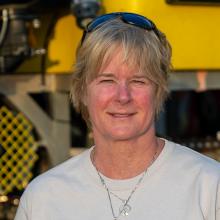
Virginia Edgcomb
Tell us about your work/research. What kinds of things do you do?
I specialize in the microbiology of low-oxygen marine habitats, which include water columns, sediments, and the deep biosphere. The reasons I am interested in these habitats include that they are expanding worldwide in response to climate change, and that we know relatively little about the activities of microorganisms in these habitats and about how they adapt to them. When I go out to sea it is normally to collect samples of seawater or sediments and to preserve them so that I can look at different types of molecules when I return to my home lab. I also conduct some studies during each expedition, such as gathering chemical data or measuring oxygen or light, or temperature. I study regions of oceans all over the world so that I can get an idea of whether we find the same microorganisms and/or the same types of activities in different locations.
What sparked your initial interest in your career?
I studied salt marsh ecology and then after my PhD I moved to a laboratory that studied microbial eukaryotes (cells that have specialized organelles) that we call protists. I was fascinated with protists because of all the different shapes, sizes, and lifestyles of these organisms. I started studying their ecology in the oceans, and I have discovered that there is a lot of protist diversity still to discover and, and so much that we don't know about the activities of diverse protist groups.
Who influenced you or encouraged you the most?
Probably my first postdoctoral advisor encouraged me the most, and gave me many opportunities to travel and to learn from other scientists. He even sent me to Australia to train under a very famous protistologist there!
What element of your work/study do you think is the most fascinating?
The most fascinating part is finding living protists and other groups of microorganisms in the most inhospitable habitats! They are often beautiful under the microscope, and it amazes me how life finds a way to survive almost everywhere we look!
What other jobs led to your current career?
I was initially a finance major, and I found that I hated working for corporate America and that I belonged outside in nature studying how things worked, and how to protect our environment.
What are your degrees and certifications?
BS Finance/minor in Environmental Science University of Virginia; PhD Biology University of Delaware 1997
What are your hobbies?
mountain biking, road biking, kayaking, hiking, the martial arts, playing with my dog, cooking, and growing vegetables and flowers.
What advice would you give someone who wants to have a career like yours?
find ways to volunteer (at least initially) in different laboratories to find out what it is like!
How did you get involved with the Ocean Exploration Trust?
I was invited to join the expedition by the science lead, with whom I collaborate to study one group of protists, the foraminifera.
It excites me to be part of a team that will likely find out some very interesting things about how life on the seafloor where there is little oxygen!
Expeditions
Virginia participated in the following Ocean Exploration Trust expeditions:
